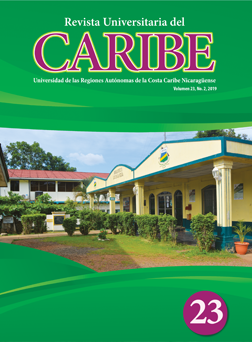The Relevant and Quality Intercultural Education: “A Right on the way”
DOI:
https://doi.org/10.5377/ruc.v23i2.8926Keywords:
Gender, Interculturality, Intercultural education, Human rightsAbstract
The objective of this essay is to offer some reflections on Intercultural Education in the Autonomous Regions based on the experiences of the Regional Autonomous Educational System (SEAR for its acronyms in Spanish) and the University of the Autonomous Regions of the Nicaraguan Caribbean Coast (URACCAN), two processes developed in the education area as a human right vindication of indigenous peoples, afro-descendants and ethnic communities in the region. The processes in which there are great improvements, there are also many challenges to overcome to move towards that education dreamed one day by women and men of the Caribbean Coast. A quality education for life is an education based on its own philosophy of life, from its own worldview and based on the principles and practices of good living, it is one of the main historical demands of the original peoples, which It has undoubtedly been present in the Nicaraguan Caribbean Coast (Hooker-Blandford, 2017) materialized at its best in the Regional Autonomous Educational System and in the creation of relevant educational instances in the case of the intercultural community university, URACCAN. Both SEAR and URACCAN represent a leap of “historical” significance, by integrating in an explicit and articulated way, the intercultural and gender approach as structuring axes of the educational model, thus integrating the proposal of two social subjects: indigenous and Afro-descendants organizations and women's organizations. Based on the above, the reflections are about education for change, gender and Interculturality at the SEAR, the Intercultural Community University, the Interculturalization of Higher Education, challenges to achieve the interculturalization of higher education.
Downloads
920
HTML (Español (España)) 284
EPUB (Español (España)) 215
Resumen (Audio) (Español (España)) 242
Abstract (Audio) 216
Downloads
Published
How to Cite
Issue
Section
License
Propietario de los derechos de autor de los artículos: Los autores guardan los derechos de autor.

Esta revista está bajo una licencia de Creative Commons Reconocimiento-NoComercial-SinObraDerivada 4.0 Internacional. Esta licencia permite que otros puedan descargar las obras y compartirlas con otras personas, siempre que se reconozca su autoría, pero no se pueden cambiar de ninguna manera ni se pueden utilizar comercialmente.

